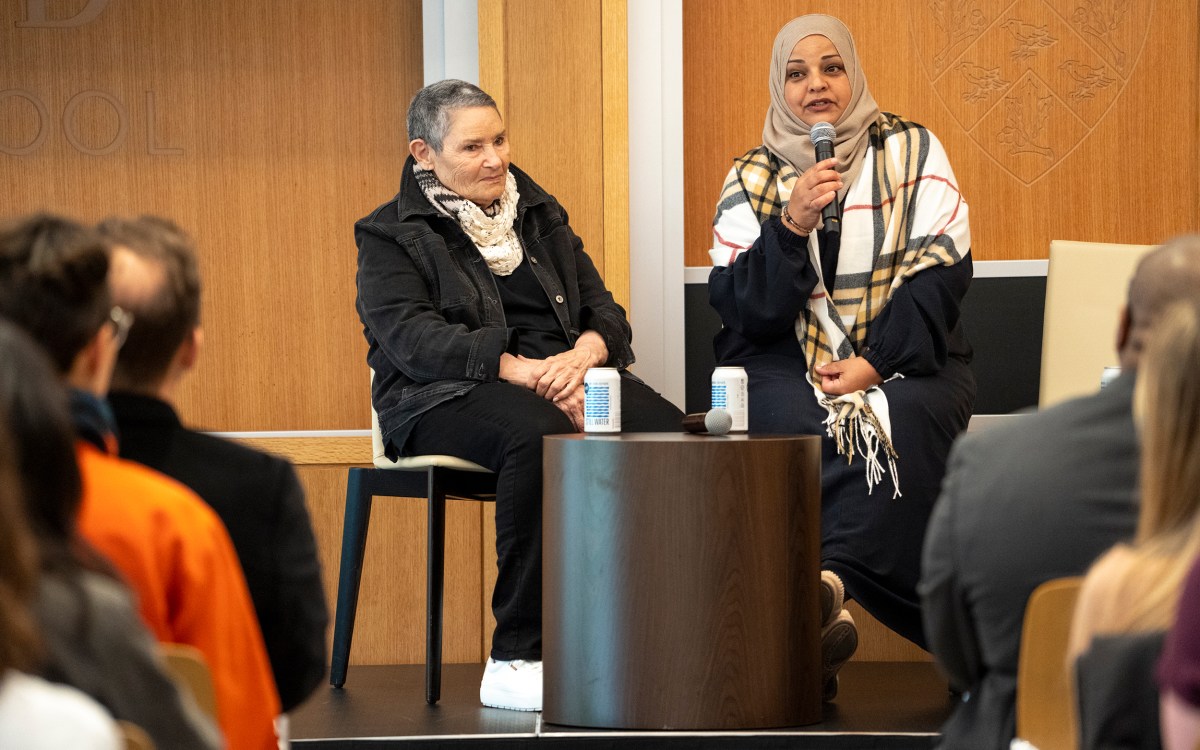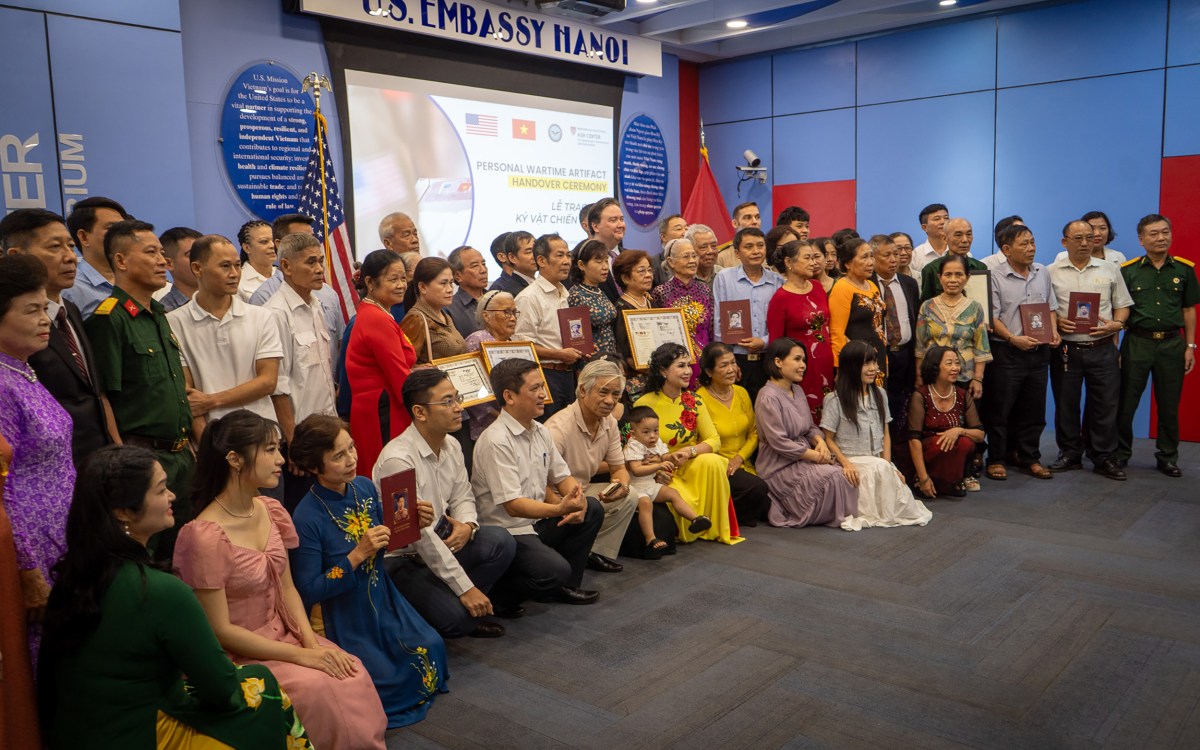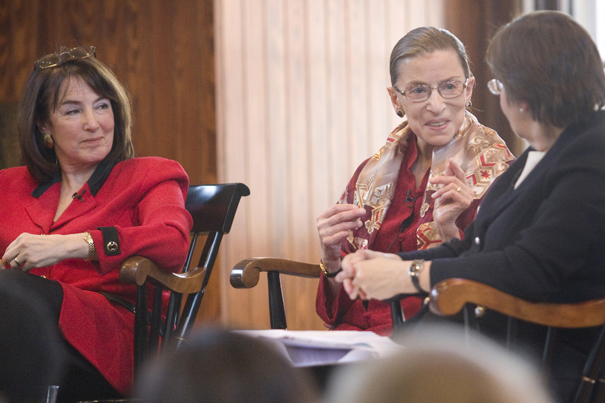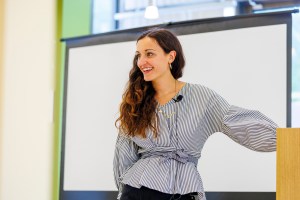Nation & World
-

A tale of three cities — and their turn to right in heartland
Government professor’s new book focuses on roles of race, class, and religion in evolution of former New Deal Democrats
-

Why do election polls seem to have such a mixed track record?
Democratic industry veteran looks at past races, details adjustments made amid shifting political dynamics in nation
-

You’d never fall for an online scam, right?
Wrong, says cybersecurity expert. Con artists use time-tested tricks that can work on anyone regardless of age, IQ — what’s changed is scale.
-

Two bereaved mothers who know price of war work for peace
Layla Alsheikh, Robi Damelin argue path to Mideast reconciliation begins with acknowledging common humanity
-

Taking the phones out of school
In podcast episode, experts discuss growing movement to restrict devices in class
-

‘The first new information we’ve heard in 50 years’
Unseen Legacies researchers are answering decades-old questions about the fates of Vietnamese soldiers
-
HBS helps Jerusalem develop ‘competitive advantages’
The mayor of Jerusalem visited Harvard Thursday (March 26) and outlined a plan for his city’s economic future, one created with the help of Harvard Business School (HBS).
-
Playwright plumbs texts, ancient and modern
You know Noh, no? Chiori Miyagawa does. The Bard College playwright-in-residence, a Radcliffe Fellow this year, has steeped herself in Noh theater, a measured style of Japanese drama that dates back to the 14th century. It’s one of the many literary echoes — some old, some ancient — that she brings to her work. “I often time travel,” Miyagawa told a lecture audience March 16 at the Radcliffe Gymnasium. “It’s my favorite thing to do as a playwright.”
-
Picture this, and you will begin to understand
It has been almost 20 years since photographer Felice Frankel started working with scientists by helping them illustrate the intricate geometries of physical worlds too tiny to see. From the beginning, she was struck by one thing: To explain their ideas, scientists always start by drawing them. That gave Frankel an idea — “Picturing to Learn,” a project that requires students to draw basic concepts so that a senior in high school might understand them. Why is the sky blue? What do ions do?
-
Panel: Housing crisis is opportunity for action
When housing prices on Main Street tumbled last year — who doesn’t know this? — tremors rumbled all the way to Wall Street, and beyond. For the first time in 40 years of record-keeping, the median price of a single-family home declined. In six months, the value of U.S. housing stock dropped $3 trillion. Credit got tight; sales and housing starts slid.

-
An attempt to define ‘academic excellence’
Michèle Lamont, Robert I. Goldman Professor of European Studies and professor of sociology and of African and African American studies, analyzes the system of peer review in her new book “How Professors Think: Inside the Curious World of Academic Judgment.”

-
Harvard conference on gender and law looks at past, present, future
It was a homecoming of sorts when Ruth Bader Ginsburg, associate justice of the U.S. Supreme Court, spoke at a conference on gender and the law today (March 12) at a conference at the Radcliffe Institute for Advanced Study.

-
New Web site aids researchers seeking funding
With literally tens of billions of dollars in federal research funding suddenly available — and application deadlines for proposals extraordinarily short — Harvard’s Provost’s Office has established a new Web site to aid faculty members seeking grants.
-
Politics may be local, but business is global
In his classes, economist Pol Antràs likes to talk about Barbie. He’s not a devoted fan of the iconic toy. Rather, the native of Spain, who studies the organizational aspects of trade, globalization, and outsourcing, uses her to make an important economic point.
-
Krook looks at how women fare in international political arena
This past Sunday (March 8) was International Women’s Day, now in its 99th year. And March is National Women’s History Month. So what better time for a scholarly look at how women are faring in the political arena? Mona Lena Krook did just that, outlining in a March 4 lecture at Radcliffe Gymnasium her years of study on how women are represented in lawmaking bodies worldwide.
-
Group looks for creative ways to understand creativity
What is creativity? Does it depend on more than that red wheelbarrow that William Carlos Williams saw? Is creativity a creature of neuron bundles, brain size, daydreaming? Is it the capacity for metaphor or divergent thinking?
-
Religious diversity explored at local level
Can a diverse religious community unite and heal after a brutal murder in broad daylight, one possibly motivated by religious hatred? That profound question and others like it, questions of religious diversity and tolerance, are at the heart of the new documentary “Fremont, U.S.A.,” which was developed by Harvard’s Pluralism Project and screened last Thursday afternoon (March 5) at Boylston Hall’s Fong Auditorium.
-
Kayyem named Homeland Security assistant secretary
Juliette Kayyem, undersecretary of homeland security for the commonwealth of Massachusetts, has been named assistant secretary of intergovernmental programs of the U.S. Department of Homeland Security. Kayyem, who is a former executive director at Harvard Kennedy School’s (HKS) Belfer Center for Science and International Affairs, is also a current member (on leave) of the Belfer Center’s board of directors, and previously served as executive director for research at the center and taught courses in public policy at HKS.
-
Harvard, ETS to study diversity at predominantly white colleges
Henry Louis Gates Jr., the Alphonse Fletcher University Professor and director of the W.E.B. Du Bois Institute for African and African American Research, has announced a collaboration with the Educational Testing Service (ETS) on a study of the experience of undergraduate members of racial and ethnic minorities on predominantly white college campuses.
-
U.K. anti-poverty strategy working, almost
In May 1997, Britain’s Labor Party won an election that ended nearly two decades of Conservative Party rule. The new liberal government, promising radical reform, took over a booming economy. But it also inherited an increase in poverty that had been rising steeply since the 1970s.
-
HMS, HSPH Professor Kim named Dartmouth president
Jim Yong Kim, tireless advocate for bringing Western standards of health care to the world’s poor and a professor of medicine and of public health at Harvard, has been named the 17th president of Dartmouth College.
-
Carter nominated to Pentagon post
President Barack Obama announced March 2 that he has nominated Ashton B. Carter to serve as undersecretary of defense for acquisition, technology and logistics. Carter’s nomination was announced in a press release along with several other key nominees.
-
Looking at the world through a comparative lens
When Steven Levitsky talks politics, a boyish enthusiasm takes over. It’s hardly surprising. He fell in love with the topic at the age of 5.
-
Taking on the ‘Godzilla Economy’
The president and CEO of the Federal Reserve Bank of Dallas delivered a somber economic message Monday night (Feb. 23) during the annual Albert H. Gordon Lecture at the John F. Kennedy Jr. Forum. But while Richard Fisher admitted that policymakers should have heeded the signs of financial stress long ago, he expressed hope that central bankers can play a key role in bringing the global economy back to health.
-
Panelists disagree sharply about Germany’s progress
A group from the worlds of politics, business, and the academy gathered at the Harvard Faculty Club for a look at “Germany in the Modern World: Division and Unity,” a student-organized conference.
-
Room for optimism after Gaza
A capacity crowd at the Harvard Kennedy School (HKS) this week (Feb. 11) got to see a scaled-down, toned-down version of the Palestinian-Israeli conflict. Instead of stones and rockets, words flew. Instead of despair, there was at least a glimmer of hope.
-
Index offers abundance of data
To employ an analogy: If Somalia were to take a math test, the chaotic nation in the Horn of Africa would score a dismal 18.9 out of 100.
-
Obama administration taps faculty, gets under way
With his historic inauguration history itself, President Barack Obama has lost no time putting his stamp on the presidency, pushing an economic stimulus package, making overtures to the Islamic world, and ordering the closing of the detention center at Guantanamo Bay, Cuba.
-
Women leaders talk about international security
A panel discussion at the Harvard Kennedy School’s (HKS) John F. Kennedy Jr. Forum Wednesday (Jan. 14) addressed the question “Will President-elect Obama’s Security Policy Be Inclusive?” — that is, how can women’s global leadership help to shape the new administration’s security goals?
-
Obama inauguration can be seen on campus
When Barack Obama is sworn in on Tuesday (Jan. 20), Harvard will celebrate its eighth alumnus to serve as president of the United States with campus-wide coverage of the inauguration.
-
Religion in the vernacular
In 1215, Pope Innocent III convened the Fourth Council of the Lateran, a religious convocation that laid out to hundreds of bishops, abbots, priors, and Christian patriarchs 70 new decrees. One enjoined the clergy to stop frequenting taverns, engaging in trials by combat, hunting, and practicing what might be called noncelibate habits.
-
Government of India gives $4.5M to support grad students
The government of India has given Harvard University $4.5 million to support fellowships for graduate students from India. The gift recognizes the accomplishments of Harvard Professor of Economics and Philosophy and Thomas W. Lamont University Professor Amartya Sen and his work for social and economic justice across the globe. It also recognizes the work of Harvard’s South Asia Initiative toward establishing Harvard as a locus for the study of South Asia.
-
Semester’s series ends with daylong panels
Sixty years ago this month, the United Nations released to a war-shocked world the Universal Declaration of Human Rights (UDHR), a catalog of norms understood to apply to all human beings.
-
War Stories: Inside Campaign 2008 at the Institute of Politics
No one will ever confuse the John F. Kennedy Jr. Forum at the Harvard Kennedy School with Gillette Stadium. But the forum was host Thursday evening (Dec. 11) to two of the undisputed rock stars of American political campaigns: David Axelrod and David Plouffe, chief strategist and manager, respectively, for Barack Obama’s successful campaign for the presidency.
-
HLS students effect real change in law, policy clinic
In October 2007, the Kansas Department of Health and Environment made the unprecedented decision to deny a permit application for three new coal-fired generating units that together would emit 11 million tons of carbon dioxide into the air each year, citing greenhouse gas emissions and climate change as the reason for the denial.
-
Panel looks at ‘the crime of all crimes’
On Dec. 9, 1948, the United Nations adopted a convention that for the first time in history provided a legal definition for genocide. Organized mass murder with the intention of destroying an ethnic or national group, a legacy of World War II, was still a fresh world memory — just as it is fresh today, in the shadow of Rwanda and, some say, Darfur.
